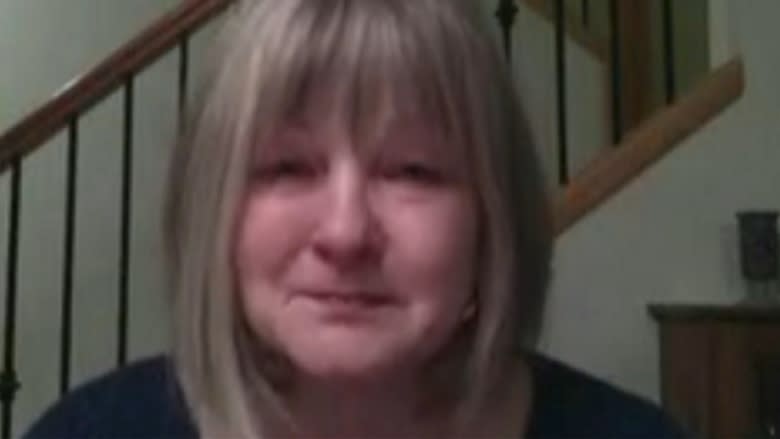Alberta investigation finds abuse at seniors facility
A provincial investigation into a woman’s treatment at an Edmonton senior’s residence has found that facility staff failed to adequately monitor and communicate her failing health to a degree that amounted to abuse.
Marion McEwen, 86, had been living at Rutherford Heights Retirement Residence in south Edmonton for four years when she was found with congestive heart failure in January 2014.
According to a report compiled by the Protection for Persons in Care office, McEwen “lived independently in the facility with minimal support from home care.”
About a year ago, however, McEwen’s daughter Dianne Mellott– who lives in Victoria – became concerned about the quality of care her mother was receiving and hired a companion to check on her.
On Jan. 21, the hired companion found McEwen in bed with a flushed face and dark circles around her eyes. McEwen also seemed to be having difficulty breathing.
“She found my mom not well, asked a nurse to come and see her,”Mellott said, adding the nurse said her mom “looked fine to her.”
According to the companion, the LPN checked McEwen’s vitals, which she said were normal.
Six days later, Mellott flew to Edmonton. She found her mother gasping for air, her face and throat swollen and flushed, while the housekeeper vacuumed the room around her.
“We found her in bed in her clothing, which was dirty.... and unable to get out of bed.”
On Jan. 27, McEwen was taken to a physician who determined she had congestive heart failure. She was taken to hospital for treatment.
McEwen died 35 days later, six days after she was transferred to Victoria.
“Our mother didn’t deserve this. We thought we were doing the best that we could do to take care of her,” Mellott said.
Investigation rules “abuse” allegations hold water
After her mother’s death, Mellott reached out to Alberta’s Protection for Persons in Care, asking the province to investigate her death and the events that led up to it.
The investigator spoke with Rutherford staff and management, and reviewed documentation around McEwen’s treatment and death.
According to the investigator, several staff members were aware she was feeling unwell as early as Jan. 20, having difficulty breathing and walking, and had failed to show up in the dining room for several meals over six days.
“Communication about the client’s illness was inadequate, monitoring of the client was minimal, no comprehensive assessment of the client was completed, and the cursory assessments that were done by LPNs were either inadequate or incomplete, and not documented,” the report reads.
The report highlights several findings, including that McEwen’s care plan had not been updated to include recent changes to her prescription and that caregivers repeatedly failed to identify or record McEwen’s vitals. There were also several discrepancies between staff and management accounts of her care.
“The validity of certain documentation is questionable as there was both lack of documentation and inaccuracies with documentation,” it reads. “Further, documentation was not monitored or corrected by any responsible person.”
A week before she was transferred to hospital, staff sent McEwen’s doctor a fax saying she had swelling around her eye. The physician did not respond and staff did not follow up.
McEwen’s care documents also appeared to show she received medical assistance from Rutherford staff after she had been transferred out of the facility.
Because Rutherford staff failed to provide “the necessities of life” – including ensuring McEwen was receiving adequate nutrition and medical attention – the investigator ruled her treatment was abuse resulting in “serious bodily harm.”
According to the report forwarded to Mellott, Rutherford Heights can appeal the results.
A spokeswoman for Rutherford Heights told CBC News she could not comment on the case due to privacy issues.
Province gives directions while daughter asks for sanctions
Following the investigation, Protection for Persons in Care issued seven directives to Rutherford Heights relating to improving seniors’ care and management.
“We have expectations for these providers, and if they miss them, we will order them to meet their obligations,” said Steve Buick, press secretary to Alberta Health Minister Stephen Mandel.
“We will stick on them and make sure that they meet our expectations – and if they don’t, they are very aware that we will find another operator who can.”
But Mellott says the directives alone are not enough. She thinks AHS should sanction the home care facility, which could result in closer supervision at the facility, or even cause it to be shut down.
“Slaps on the wrist are not going to impact the people that are making those mistakes,” she said. “I think a little fear on behalf of people providing these services is not such a bad thing.”
But Buick said AHS rarely sanctions care providers. He said 65,000 people are currently in home care in the province.
“The reality is things are going to go wrong,” he said.
“We don’t need to penalize people, we need to learn from it and make sure that we hold people accountable to those standards.”
But Mellott isn’t satisfied.
“My mother could have been anybody’s mother,” she said.



